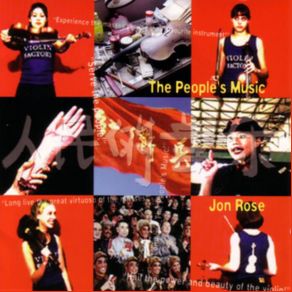The People's Music
Download links and information about The People's Music by Jon Rose. This album was released in 2003 and it belongs to Rock, Alternative genres. It contains 13 tracks with total duration of 44:07 minutes.

|
|
|---|---|
| Artist: | Jon Rose |
| Release date: | 2003 |
| Genre: | Rock, Alternative |
| Tracks: | 13 |
| Duration: | 44:07 |
| Buy it NOW at: | |
| Buy on iTunes $9.99 | |
Tracks
[Edit]| No. | Title | Length |
|---|---|---|
| 1. | Start The People | 3:26 |
| 2. | Wake Up People! | 1:15 |
| 3. | Working People | 2:37 |
| 4. | No People | 0:43 |
| 5. | Your People | 5:18 |
| 6. | Some People | 2:19 |
| 7. | People Control | 2:58 |
| 8. | Big People | 6:39 |
| 9. | Odd People | 4:08 |
| 10. | Noisy People | 4:43 |
| 11. | Busy People | 3:07 |
| 12. | The People's Struggle | 2:18 |
| 13. | The People's End | 4:36 |
Details
[Edit]The People's Music builds on the concept and musical themes presented in The Violin Factory. The Chinese violin factories from Mao Zedong's era — and their later demise — become an allegory on control of the masses, music and art as propaganda, and the dichotomy of mass production and music-making. The Violin Factory involved a string orchestra, live sampling added to the performance in real time, internet contributions, narration, and live video art. For The People's Music, Jon Rose chose simpler means. The performance is for the most part acoustic, the composer adding some live sampling (but nothing as drastic as Kaffe Matthews' work on the previous album). Conducted by Lindsay Vickery, the string ensemble (members of The West Australian Youth Orchestra and The University of Western Australia String Orchestra) is accompanied by an "industrial percussion ensemble" of three musicians and Lely Evans portraying a "Screaming Red Guard Factory Guide" — her role, a Red Guard stereotype, is quite different from the guide integrated into the previous work. Sounds and video footage from the factories are still embedded here, and Rose often has the strings follow the see-sawing sounds made by the violin makers, or mimic Suzuki violin classes. The music ranges from delicate noise-making to glorious, overtly emotional string themes, gripping film-like passages, and moments that sound like orchestral arrangements of industrial rock. The 13 pieces all segue, forming a continuous 45-minute work that is akin in approach to Rose's hörspiels (see The Fence, Brain Weather, and Violin Music in the Age of Shopping, among others). Less striking and perplexing than The Violin Factory, this album is also more listener-friendly. And, from a superficial point of view, it ranks among Rose's less confusing albums. ~ François Couture, Rovi